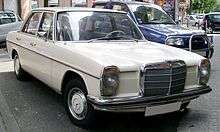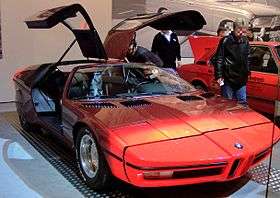Paul Bracq
Paul Bracq (born December 13, 1933, Bordeaux, France) is an automotive designer noted for his work at Mercedes-Benz, BMW, Citroën,and Peugeot.

Career
Bracq's career began in the design studio of Philippe Charbonneaux, serving as his assistant in 1953 and 1954. During this period, the studio produced the designs for the French Presidential limousine built by Citroën, a one-off Pegaso coupe, and other automobiles.
Bracq served his mandatory military service from late 1954 through 1957. Subsequently, he worked for Daimler-Benz, heading its design studio in Sindelfingen, a post he would hold for ten years. Bracq styled the Mercedes 600, 230SL/250SL/280SL roadster, the 220S coupé, the 250 and 220D, the W108 and W114 coupe series, and its stablemate the W115 – all of the '60s and '70s.
Upon his return to France in 1967, Bracq worked for Brissonneau and Lotz, where he worked on the design of the TGV high-speed passenger train led by Jacques Cooper. During this time, Bracq was also responsible for prototypes of a sports car based on the BMW 1600Ti and a coupé based on the Simca 1100.
In 1970, Bracq was appointed design director of BMW, where he was responsible for the initial designs of the top-of-the-line 7 Series. His 1973 "Turbo" concept car won "Concept Car of the Year" by the Revue Automobile Suisse that year; the car repeated the feat in 1992 in the Bagatelle Concours d'Elegance.
Braque began with Peugeot in 1974, going on to design personal transportation for the Pope and the interiors of the Peugeot 604[1] and the 505.[2]
Bracq is also active as a judge in many automotive concours, including the Pebble Beach Concours d'Elegance.
References
- Pagneux, Dominique (2000), La Peugeot 604 de mon père.. ETAI, Boulogne-Billancourt, France.
- Hogg, Tony (ed.). "Peugeot 505: "Progress not compromise, the Peugeot for the Eighties" — P.S.A. Peugeot-Citroën". Road & Track's Road Test Annual & Buyer's Guide 1981 (January–February 1981): 142.
External links
- Timeline of Paul Bracq's career
- BMW Designers, an overview of automotive designers working for BMW
